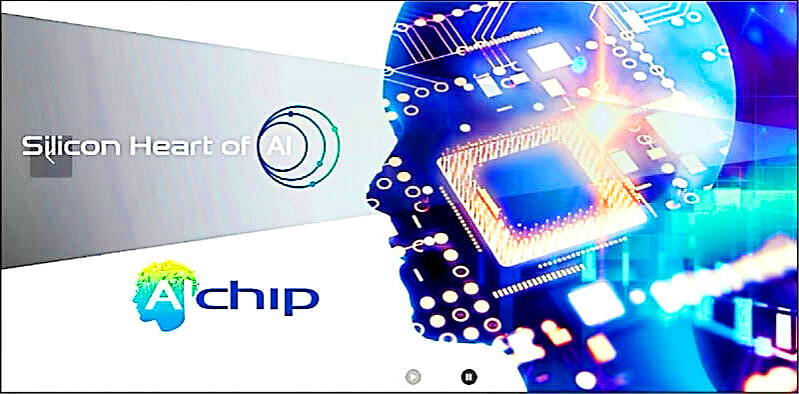Alchip Technologies Ltd (世芯), an application-specific integrated circuit (ASIC) designer specializing in artificial intelligence (AI) chips, yesterday said revenue would pick up significantly next year after a major customer’s 3-nanometer chip enters volume production.
Revenue has been dipping for the past four quarters as a key customer’s 5-nanometer AI accelerator is approaching the end of its lifecycle. Revenue in the third quarter sank 51.5 percent annually, or down 25 percent sequentially, to US$223 million.
The company attributed the decline to lower revenue contribution from 5-nanometer and 3-nanometer chips due to capacity shortage. Alchip counts Amazon.com Inc and Intel Corp among its customers.

Photo: Screengrab from the Alchip Technologies Web site
“We anticipate a further revenue decline this quarter,” Alchip chairman and chief executive officer Johnny Shen (沈翔霖) told an online earnings conference.
“Looking ahead, we remain highly optimistic about the AI market. From 2026 to 2029, we expect our growth to stay in line with the industry and ahead of competitors,” Shen said.
Alchip generated 79 percent of its revenue by supplying ASICs used in high-performance computing devices, such as AI servers, in the third quarter.
Revenue is likely to jump next year as a 3-nanometer chip ramps up production in the second quarter for a North American customer, Alchip chief financial officer Daniel Wang (王德善) said.
The customer has placed a large order for 3-nanometer chips from Taiwan Semiconductor Manufacturing Co (TSMC, 台積電) and tried to squeeze more capacity from TSMC amid supply constraints, Wang said.
“This 3-nanometer chip revenue definitely could be a multiple-billion [dollar] business for us as a whole,” he said.
The company expects a new automotive chip, set to enter volume production later this quarter, to drive its growth next year, it said.
Alchip expects the gross margin this quarter to climb from 28 percent last quarter, thanks to growth in non-recurring engineering (NRE) income, Shen said.
NRE refers to one-time charges for chip designing and test services.
Alchip has booked NRE income from a 2-nanometer chip design project earlier this quarter and expected more to come later this quarter, it said.
The growth in NRE income would help boost this quarter’s earnings to the strongest of this year, as NRE business delivers higher gross margin than chip production business, Shen said.
Net income expanded 3.1 percent last quarter to US$44.26 million from US$42.94 million in the second quarter, ending two quarters in decline. On an annual basis, net income shrank 20.32 percent from US$55.55 million.
Earnings per share improved to NT$16.4 from NT$16.37 in the second quarter. That represents a decline from NT$22.46 a year ago.

NEW IDENTITY: Known for its software, India has expanded into hardware, with its semiconductor industry growing from US$38bn in 2023 to US$45bn to US$50bn India on Saturday inaugurated its first semiconductor assembly and test facility, a milestone in the government’s push to reduce dependence on foreign chipmakers and stake a claim in a sector dominated by China. Indian Prime Minister Narendra Modi opened US firm Micron Technology Inc’s semiconductor assembly, test and packaging unit in his home state of Gujarat, hailing the “dawn of a new era” for India’s technology ambitions. “When young Indians look back in the future, they will see this decade as the turning point in our tech future,” Modi told the event, which was broadcast on his YouTube channel. The plant would convert

‘SEISMIC SHIFT’: The researcher forecast there would be about 1.1 billion mobile shipments this year, down from 1.26 billion the prior year and erasing years of gains The global smartphone market is expected to contract 12.9 percent this year due to the unprecedented memorychip shortage, marking “a crisis like no other,” researcher International Data Corp (IDC) said. The new forecast, a dramatic revision down from earlier estimates, gives the latest accounting of the ongoing memory crunch that is affecting every corner of the electronics industry. The demand for advanced memory to power artificial intelligence (AI) tasks has drained global supply until well into next year and jeopardizes the business model of many smartphone makers. IDC forecast about 1.1 billion mobile shipments this year, down from 1.26 billion the prior

People stand in a Pokemon store in Tokyo on Thursday. One of the world highest-grossing franchises is celebrated its 30th anniversary yesterday.

Zimbabwe’s ban on raw lithium exports is forcing Chinese miners to rethink their strategy, speeding up plans to process the metal locally instead of shipping it to China’s vast rechargeable battery industry. The country is Africa’s largest lithium producer and has one of the world’s largest reserves, according to the US Geological Survey (USGS). Zimbabwe already banned the export of lithium ore in 2022 and last year announced it would halt exports of lithium concentrates from January next year. However, on Wednesday it imposed the ban with immediate effect, leaving unclear what the lithium mining sector would do in the